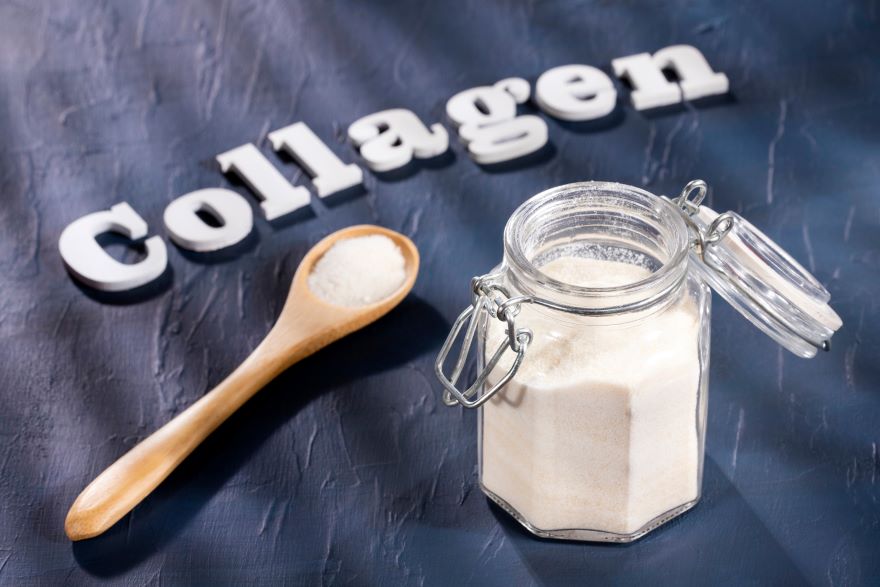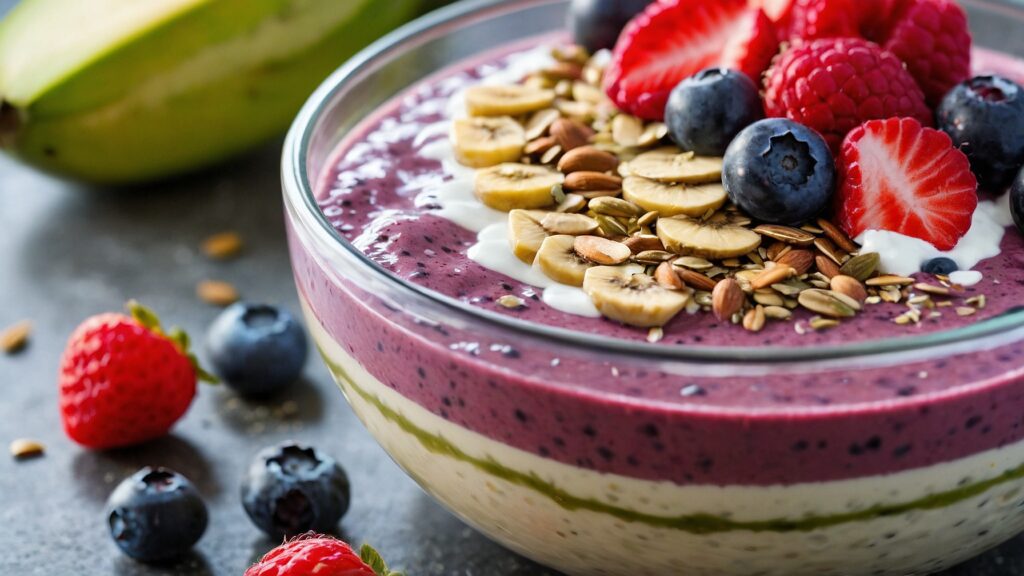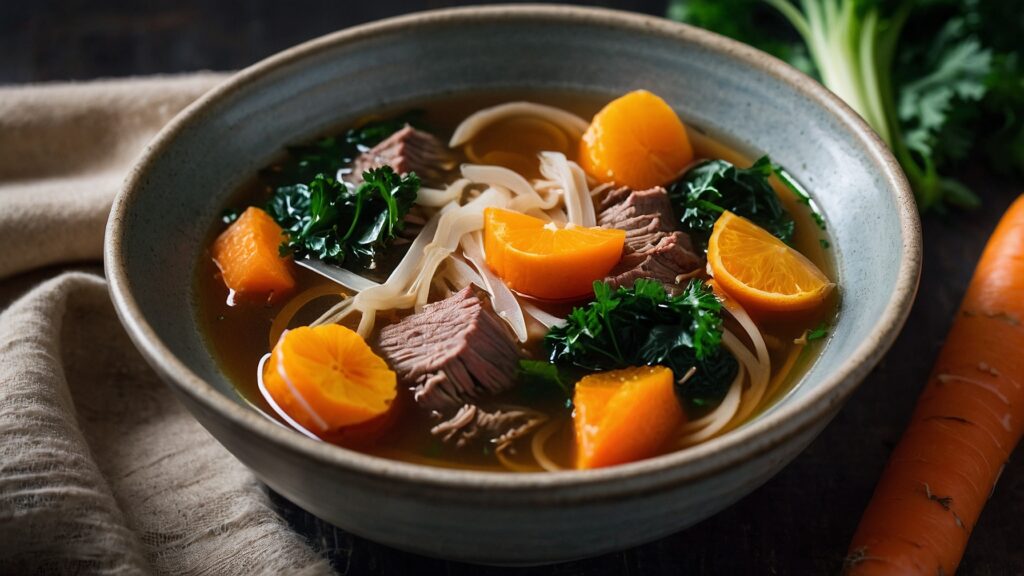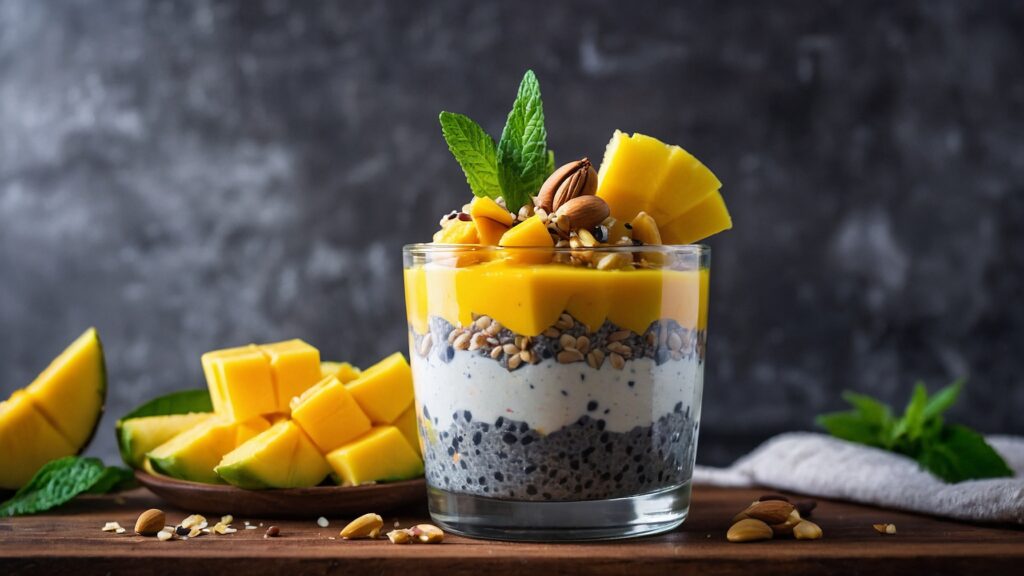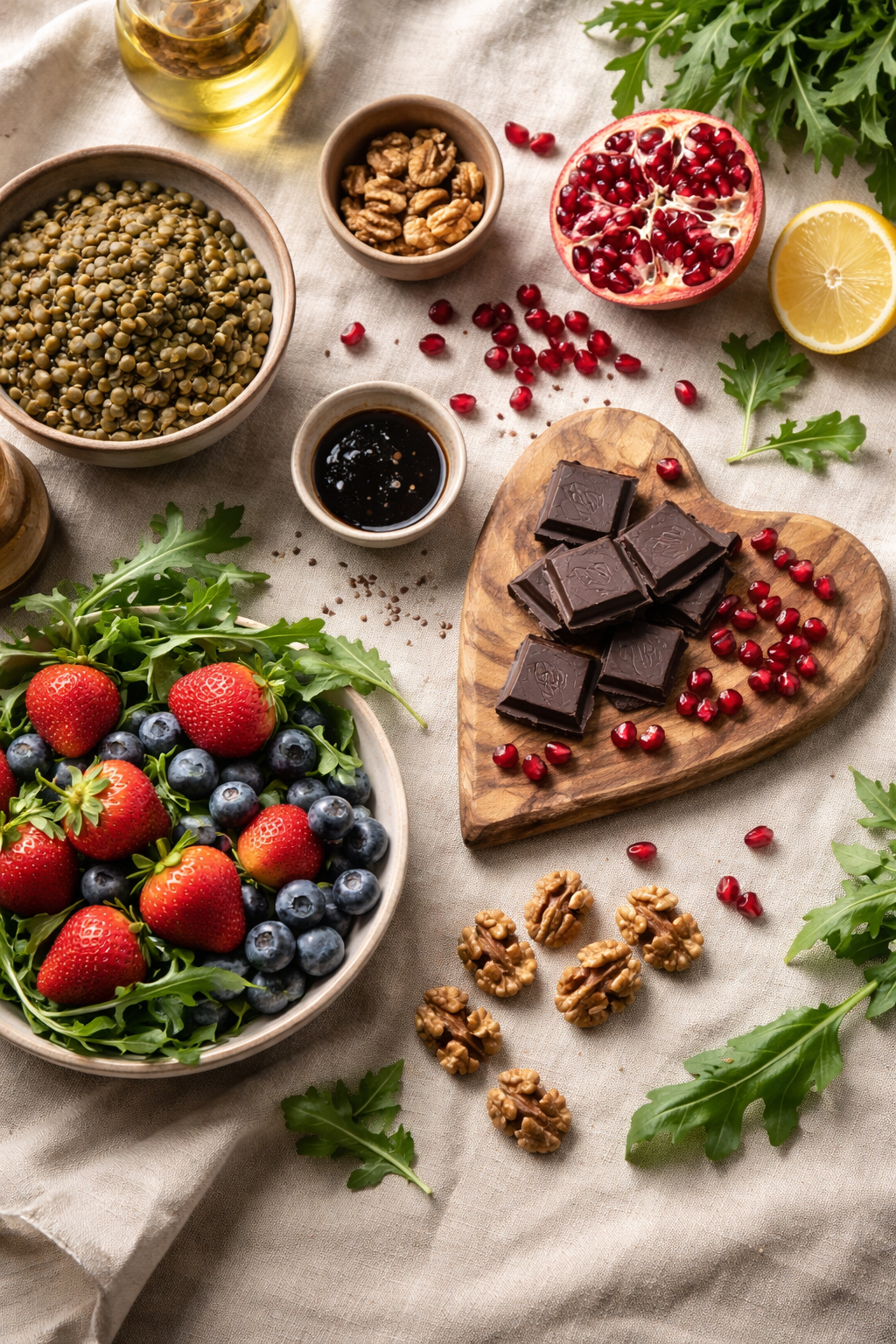I’ve discovered a hidden treasure – collagen, the silent guardian keeping me intact, literally. As I aged, I’ve noticed my skin losing its bounce and my joints getting stiff. However, one day, I came across collagen-rich foods and realized that I’m not just eating; I’m improving myself from the inside out. In fact, collagen is a powerful combination of protein, vitamins, and minerals, which are the essential building blocks my body craves.
Moreover, with every bite, I’m giving my skin a fighting chance against wrinkles and my joints the strength to keep up with my adventures. My plate has become a colorful arsenal of collagen enhancers, and it’s not just about looking good—it’s about feeling invincible. In essence, this isn’t a diet; it’s my strategy for aging on my terms, and I’m embracing it wholeheartedly.
Key Takeaways
- Not only is this tropical collagen-boosting chia pudding parfait delicious, but it’s also a nutrient-packed treat that promotes healthy skin. Discover the recipe now!
- Intaking collagen-rich foods and supporting nutrients can decrease the natural decline in collagen production attributed to aging.
- Combining a nutrient-rich diet with strategic supplementation can effectively maintain and boost our body’s collagen levels.
Understanding Collagen
Collagen And Its Types
Type 1 Collagen
Collagen is a crucial protein that plays a vital role in maintaining healthy skin, hair, bones, muscles, and tendons. In fact, it’s essentially the glue that holds our body together! Type I collagen is the most abundant collagen of the human body, consisting of around 90% of the body’s total collagen in vertebrates.
Moreover, Type 1 collagen is a robust protein that serves as the primary building block of our skin, tendons, bones, and teeth. This type of collagen provides strength, structure, and elasticity to these tissues. In addition to its structural role, Type I collagen is also essential for tissue integrity in bone, skin, and connective tissues.
- Skin: This type of collagen creates a firm fiber network, and enhances skin smoothness and slowing aging.
- Tendons and Ligaments: It contributes to the structural integrity and strength, but also supports the function of muscles and bones.
Type 2 Collagen
Building upon the importance of collagen in the human body, it’s worth noting that Type II collagen is known as the “joint lubricator.” This is because it serves as the main component of cartilage, providing strength, shock absorption, and lubrication for joints. In fact, Type II collagen is essential for maintaining healthy articular cartilage and joint function.
- Cartilage: Type 2 collagen is not only crucial for the formation of chondrocytes, the cells responsible for producing cartilage, but it also plays a vital role in maintaining these cells, ensuring the integrity and proper function of cartilage tissue.
- Joint Health: Type 2 collagen production declines with age, causing stiff joints and weak cartilage.
Type 3 Collagen
Transitioning from the discussion of Type II collagen, it’s important to recognize that Type III collagen also plays a crucial role in the human body. This vital protein is found in skin, blood vessels, and organs throughout the body. In fact, Type III collagen is present alongside Type I collagen in skin, arteries, and uterine tissue, contributing to their structure and function.
- Skin: It works alongside type 1 collagen to enhance its properties and provide additional support. There is a lot of type 3 collagen in the deeper layers of the skin, helping with elasticity and strength for a younger, plump appearance.
- Blood Vessels: It provides structural support and helps maintain the integrity and strength of blood vessels.
- Organs: A type of collagen that plays a role in the structure of internal organs, including the liver, lungs, and intestines.
Boosting Collagen Production
- Amino Acids: Found in bone broth, meats, fish, dairy, and eggs.
- Vitamin C: Citrus fruits, red and green peppers, tomatoes, and dark green leafy vegetables are rich in vitamin C, which is essential for collagen synthesis. Moreover, consuming a diet rich in these foods can help support the body’s natural collagen production process.
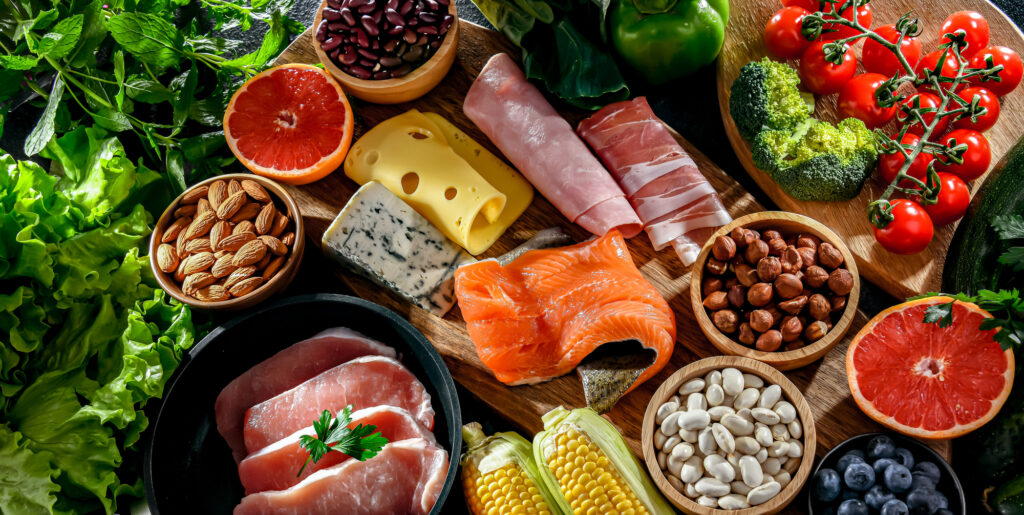
Benefits of Collagen
Collagen provides a multitude of benefits:
- Skin: Improves elasticity and strength, and reducing wrinkles and fine lines.
- Hair and Nails: Boosts strength and vitality.
- Joints: Helps reduce joint pain by maintaining cartilage health.
- Digestive System: Supports the digestive tract lining, therefore preventing gastrointestinal problems.
Understanding collagen’s types, production, and benefits empowers us to make informed decisions about maintaining or boosting collagen levels.
Collagen as a Superfood
In my pursuit of better health, I’ve recognized the significance of collagen, a pivotal protein for skin, hair, nails, and joints. As we age, our natural collagen production decreases, and this leads to wrinkles, sagging skin, and weakened joints. This is where collagen superfoods come into play.
Forms of Collagen Superfood
Exploring various forms of collagen superfoods available in the market, I’ve found some excellent options:
- Rootz Collagen Superfood: By using 100% whole food and plant-based ingredients, it makes it more suitable for those who prefer avoiding fillers and chemical additives.
- Orgain’s Collagen + Superfoods: Combines grass-fed collagen with vitamin C from Acerola Cherry and a blend of 11 superfoods to support immunity. This great product allows me to incorporate collagen into my diet in different ways for maximum benefits.
- Rich in vitamin C to support collagen synthesis
- No Dairy ingredients, No Soy ingredients
- Non-GMO, No Artificial Flavors or Colors
- 20 grams of Grass-Fed Collagen
- Gluten free and No sugar added
Collagen in Our Diet
Natural Sources of Collagen
Maintaining healthy and younger skin has led me to discover the importance of collagen. To boost collagen production, it’s crucial to consume a variety of collagen sources.
Protein-Rich Foods:
- Bone Broth: A rich source of collagen, providing essential amino acids.
- Fish: Rich in omega-3 fatty acids, salmon and mackerel stand out as excellent sources.
- Nuts: Almonds and pecans, are known for aiding collagen synthesis.
Collagen Supplements:
- Collagen Powder: By adding this to smoothies or coffee, it will give you a daily boost.
- Healthline: Recommends incorporating collagen into a healthy lifestyle for better skin and joint health.
The Role of Vitamins and Minerals in Collagen Synthesis
Vitamin C:
- Sources: Citrus fruits, strawberries, and bell peppers.
- Function: Converts amino acids into stable collagen, and protects existing collagen from free radicals.
Maximize your intake of collagen-boosting nutrients with the Breville BJE830BSS Juice Fountain Cold XL Centrifugal Juicer. This high-performance juicer efficiently extracts vitamins and minerals from fruits and vegetables, helping you create delicious, collagen-supporting juices with ease.
- The Breville Juice Fountain Cold XL features a bigger 3.5 inch feed chute and can extract 70 fl oz of nutrient rich juice up to five times faster than a 'cold press' machine; Juicer equipped with Cold Spin Technology and Noise Reduction Technology
- COLD EXTRACTION SYSTEM: A Breville juicer with Cold Spin Technology and an Italian-made precision mesh filter, allows you to avoid damage to vitamins and minerals from heat and processing
- SHORT PREP TIME: The Breville Juice Fountain Cold XL's unique 3.5 inch extra wide chute feed allows you to juice whole fruits and vegetables without pre-cutting
- SPACE SAVING DESIGN: With the pulp bin located behind the product base, the Juice Fountain Cold XL features a new and unique space saving design for a better use of your countertop space
- NOISE REDUCTION TECHNOLOGY: Imagine great performances that’s easier on the ear; Juicing on quiet setting reduces mechanical noise by 40%
Zinc:
- Sources: Oysters, beef, and pumpkin seeds.
- Function: Catalyzes enzymes for collagen production, and strengthens connective tissues.
Copper
- Sources: Nuts, seeds, and whole grains.
Function: Forms cross-links between collagen fibers, vital for skin and tendon health.
Impact of Collagen on Health and Aging
Skin Health:
- Effects: Improved firmness, hydration, and elasticity.
- Healthline: Supports the use of collagen peptides for older adults.
Joint Health
- Effects: Reduces joint pain, and improves function.
- Review of the Effects of Collagen Treatment: Highlights significant benefits for joint health.
Bone Health:
- Effects: Collagen plays a crucial role in bone health, and supports bone density
- Harvard.edu: Stresses the importance of maintaining collagen production for bone health.
Hair Health
- Effects: Promotes strength and vitality of hair.
- Mechanism: Supports the structure of hair follicles and provides essential amino acids.
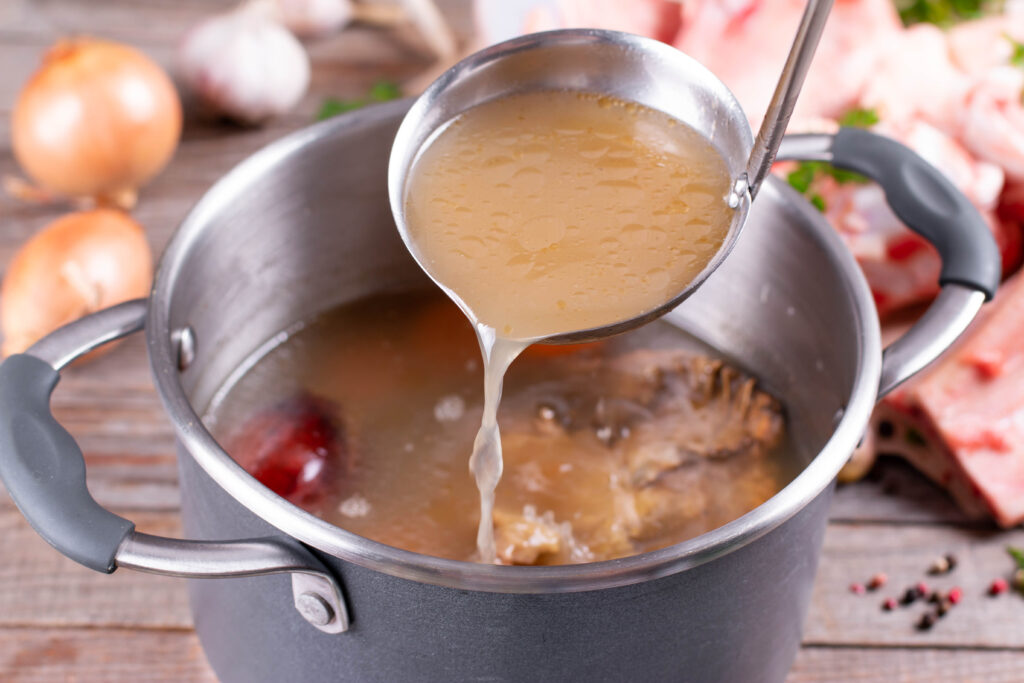
How to Incorporate Collagen into Your Life
Collagen-Rich Recipes
Collagen-Rich Recipes:
- Bone Broth: Rich in collagen and nutrients.
- Smoothies: Add collagen powder for an easy daily intake.
Elevate your collagen-boosting routine with the Vitamix A3500 Ascent Series Smart Blender. This powerful appliance makes creating nutrient-packed smoothies and blending collagen supplements into your favorite recipes effortless, ensuring you get the most out of your collagen-rich ingredients.
- Program Settings: Five program settings (for Smoothies, Hot Soups, Dips & Spreads, Frozen Desserts, and Self-Cleaning) ensure walk-away convenience and consistent results. The A3500 pairs with the Vitamix Perfect Blend App: Unlock the Ascent Series A3500's full potential with 17 programs and 500+ recipes with the iOS + Android app.
- Touchscreen Controls give the machine a sleek silhouette and are easily wiped clean.Electrical Ratings - 120 V, 50-60 Hz, 12 Amps. Cord: 4 feet. HP: 2.2-peak
- You're in Control: Variable Speed Control and Pulse feature let you manually fine-tune the texture of any recipe
- Built-In Wireless Connectivity: The motor base is able to read the container size you’ve chosen and automatically adjust program settings and maximum blending times accordingly. Add a range of compatible container sizes, building a customized blending system designed to fit your needs.
- Programmable Timer: A built-in timer helps avoid over- or under-processing your custom recipes. Set the timer to the length of your blend, and it will turn the machine off automatically. What's in the Box: motor base, low-profile 64 oz. container, low-profile classic tamper, Simply Blending Cookbook
Daily Habits:
- Morning Coffee: Add collagen powder to support skin, hair, and nails.
- Superfoods: Include kale and nuts in salads to boost collagen production.
Potential Side Effects and Considerations
Digestion and Allergies:
- Considerations: Start with small doses to avoid digestive issues. Check labels for allergens if you have food sensitivities.
Dietary Restrictions:
- Dairy and Gluten-Free: Ensure supplements are free from these if you have intolerances.
- Vegan Alternatives: Explore plant-based options like amino acid blends or algae-derived supplements.
Check out these mouth-watering recipes!
Final thoughts
Let me tell you about my journey with collagen, a protein that forms the essential foundation of our body’s structure and vitality. Through my experience, I’ve discovered that collagen is crucial for maintaining skin firmness and joint flexibility. In fact, not only does collagen support bone strength, but it also enhances muscle recovery, making its benefits wide-ranging and essential for overall health and well-being. Moreover, thanks to my collagen-infused routine, I now have that coveted plump look, which has been a game-changer for my confidence and overall well-being.
The transformative effects of collagen have revolutionized my approach to health and wellness. Not only has my skin become more radiant and smooth, but my muscles and joints are feeling fantastic too. In fact, they’ve become noticeably more flexible and resilient. Moreover, I’ve embraced collagen-rich foods like leafy greens, tomatoes, bell peppers, chicken, and fish, and my body is absolutely loving it! These vibrant foods and protein sources are filled with nutrients that help my body produce collagen efficiently, further enhancing the benefits I’ve experienced.
I’m not claiming that collagen is a fix for everyone, as each person’s body has its own rhythm. However, waking up each day feeling more vibrant with smoother skin and more flexible joints contributes to a sense of rejuvenation and confidence. Moreover, incorporating collagen supplements into your daily routine may substantially improve your holistic health and vitality. In fact, collagen offers a spectrum of potential benefits, from supporting skin elasticity to promoting joint health. Ultimately, you might end up embracing it just like I have!

*We may earn a commission for purchases made using our links. Please see our disclosure to learn more.

